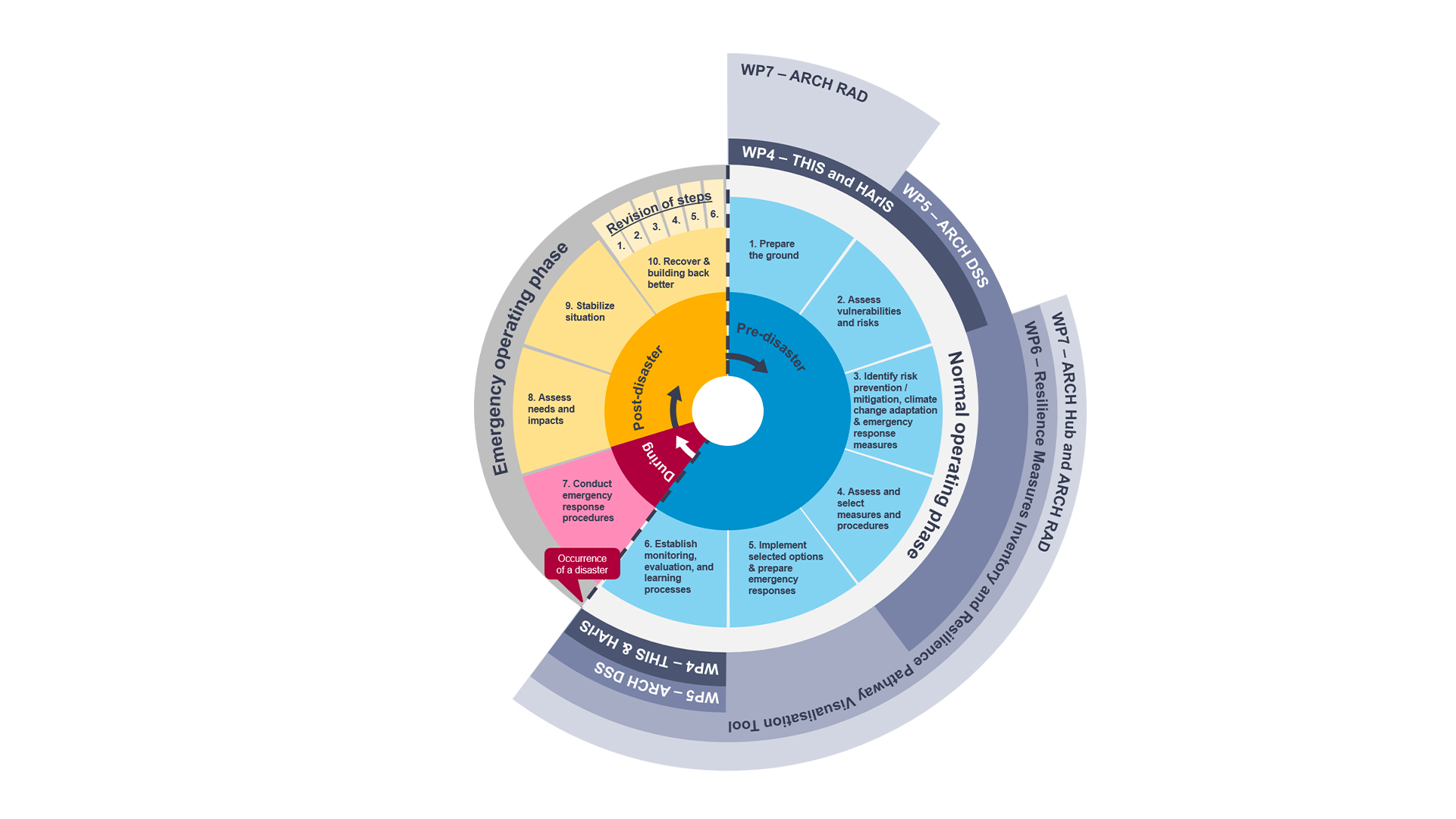ARCH-Advancing Resilience of Historic Areas against Climate-related and other Hazards
Cultural Heritage, Risk assessment, Natural Hazards, Structual health Monitoring, Multi-consequence analysis

ARCH will develop a unified disaster risk management framework for assessing and improving the resilience of historic areas to climate change-related and other hazards. This will be achieved by developing tools and methodologies that will be combined into a collaborative disaster risk management platform for local authorities and practitioners, the urban population, and (inter)national expert communities. To support decision-making at appropriate stages of the management cycle, different models, methods, tools, and datasets will be designed and developed. These include: technological means of determining the condition of tangible and intangible cultural objects, as well as large historic areas; information management systems for georeferenced properties of historic areas and hazards; simulation models for what-if analysis, ageing and hazard simulation; an inventory of potential resilience enhancing and reconstruction measures, assessed for their performance; a risk-oriented vulnerability assessment methodology suitable for both policy makers and practitioners; a pathway design to plan the resilience enhancement and reconstruction of historic areas; and an inventory of financing means, categorised according to their applicability in different contexts. The project ensures that results and deliverables are applicable and relevant by applying a co-creation process with local policy makers, practitioners, and community members. This includes the pilot cities Bratislava, Camerino, Hamburg, and Valencia. The results of the co-creation processes with the pilot cities will be disseminated to a broader circle of other European municipalities and practitioners. ARCH includes a European Standardisation organization (DIN) as a partner in order to prepare materials that ensure that resilience and reconstruction of historic areas can be progressed in a systematic way, through European standardisation, which will ensure practical applicability and reproducibility.
Periodo
giugno 2019 — agosto 2022
Durata
36 mesi + 2mesi (estensione Covid 19)
Responsabile scientifico
UniCAM
Tipologia di bando competitivo
Horizon 2020
Call: H2020-LC-CLA-2018-2019-2020
(Building a low-carbon, climate resilient future: climate action in support of the Paris Agreement)
Gruppo di ricerca
Andrea Dall'Asta, Alessandro Zona, Enrica Petrucci, Graziella Roselli, Marco Materazzi, Michele Morici, Graziano Leoni
Partner
- 1 FRAUNHOFER GESELLSCHAFT ZUR FOERDERUNG DER ANGEWANDTEN FORSCHUNG E.V.
- ICLEI EUROPEAN SECRETARIAT GMBH (ICLEI EUROPASEKRETARIAT GMBH)
- DIN DEUTSCHES INSTITUT FUER NORMUNG E.V.
- FUNDACION TECNALIA RESEARCH & INNOVATION
- AGENZIA NAZIONALE PER LE NUOVE TECNOLOGIE, L'ENERGIA E LO SVILUPPO ECONOMICO SOSTENIBILE
- UNIVERSITA DEGLI STUDI DI CAMERINO
- ISTITUTO NAZIONALE DI GEOFISICA E VULCANOLOGIA
- SOGESCA s.r.l.
- Research for Science, Art and Technology (RFSAT) Limited Ireland
- MUNICIPAL MONUMENT PRESERVATION INSTITUTE IN BRATISLAVA
- UNIVERZITA KOMENSKEHO V BRATISLAVE
- HLAVNE MESTO SLOVENSKEJ REPUBLIKY BRATISLAVA
- FUNDACION DE LA COMUNITAT VALENCIANA PARA LA PROMOCION ESTRATEGICA EL
DESARROLLO Y LA INNOVACION URBANA - COMUNE DI CAMERINO
- FREIE UND HANSESTADT HAMBURG
Budget complessivo
€ 6.000.000
Finanziamento ad Unicam
€ 380.000
Altri progetti o proposte correlate a questa ricerca
- PROCULT (Far 2012)
- InnoHyco (EU-RFCS 2010-13)
- MULTICLIMACT (EU-H2020 Proposal 2023)

